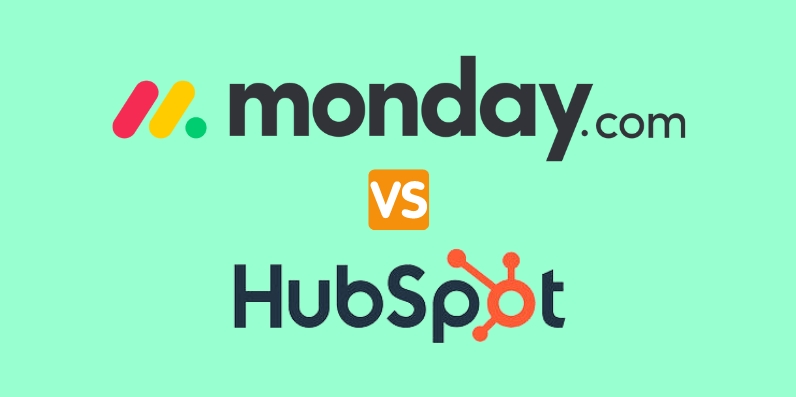Table of Contents
I. Introduction
HubSpot and Monday.com are two major players in the marketing software industry. While they serve different niches (HubSpot focuses on inbound marketing and sales software, while Monday.com provides project management and collaboration tools), both companies rely heavily on marketing to drive sales and user adoption. By analyzing and comparing their marketing strategies, we can uncover insights and best practices that can be applied to our own marketing efforts.
II. Background on HubSpot and Monday.com
HubSpot was founded in 2006 by Brian Halligan and Dharmesh Shah with the mission of helping businesses attract, engage, and delight customers. Their product offerings include a CRM platform, marketing automation software, sales software, and customer service software. HubSpot’s target audience is mainly small and medium-sized businesses.
Monday.com, on the other hand, was founded in 2012 by Roy Mann and Eran Zinman as a project management software, with the aim of making team collaboration simpler and more intuitive. Their target audience is mainly small, medium, and large businesses across various industries worldwide.
III. Content Marketing Strategy
Both HubSpot and Monday.com employ content marketing as a core component of their marketing strategy. They create blog posts, ebooks, webinars, social media content, and other digital marketing materials to educate and engage their target audience.
When it comes to blog posts, HubSpot has been publishing consistently for over a decade and has a vast library of content that covers virtually every aspect of inbound marketing. Their blog has established them as thought leaders in the space, attracting millions of monthly visitors and backlinks from high-authority websites.
Monday.com’s blog, while relatively newer, has started to gain a following thanks to their strategic use of topic clusters and a conversational writing style. Their content is short, visual, and geared towards busy professionals looking for quick tips and tricks.
On social media, HubSpot’s strategy is to share informative content that educates their followers on various aspects of inbound marketing, while Monday.com uses social media primarily for product updates and event promotion.
IV. Search Engine Optimization (SEO) Strategy
Both HubSpot and Monday.com employ SEO tactics to improve their search engine rankings and attract organic traffic to their websites. They conduct keyword research and optimize their website content and metadata to target relevant keywords.
HubSpot has a well-established and comprehensive SEO strategy that includes in-depth guides, pillar pages, and topic clusters that provide a holistic view of various marketing topics. They also have a robust backlinking strategy that has helped them maintain their position as an industry leader.
Monday.com’s SEO strategy is focused on improving their rankings for specific long-tail keywords related to project management and team collaboration. They have optimized their website content around relevant keywords and have also created helpful resources like ebooks and case studies to attract links and improve their domain authority.
V. Advertising Strategy
Both HubSpot and Monday.com use advertising to promote their products and attract new customers. They use a variety of channels including Google Ads, Facebook Ads, LinkedIn Ads, and other social media ads.
HubSpot’s advertising strategy is primarily focused on promoting their CRM and sales software to decision-makers at target companies. They use a mix of ad formats including image ads, carousel ads, and video ads to showcase their products’ features and benefits.
Monday.com’s advertising strategy is geared towards promoting their collaboration software to teams and individuals. They use colorful and eye-catching graphics to showcase their product’s flexibility and customizability.
VI. Customer Engagement and Retention Strategy
Both HubSpot and Monday.com place a lot of emphasis on engaging and retaining customers. They employ multiple channels and strategies to keep their customers happy and loyal.
HubSpot’s customer engagement and retention strategy includes dedicated customer success managers, support chatbots, a comprehensive knowledge base, and a user community forum. They also host regular training events and webinars that help customers make the most out of their product.
Monday.com’s customer engagement and retention strategy includes a highly responsive support team, a comprehensive knowledge base, a user community forum, and targeted email campaigns that provide personalized tips and suggestions to customers. They also have an extensive library of customer success stories that showcase how their product has helped companies across various industries.
VII. Conclusion
As we have seen, HubSpot and Monday.com employ different marketing strategies that are tailored to their target audience and product offerings. While HubSpot focuses on inbound marketing and sales software for SMBs, Monday.com provides project management and collaboration tools for teams of all sizes. However, both companies place a lot of emphasis on content marketing, SEO, advertising, and customer engagement to drive sales and user adoption. By analyzing and adapting these strategies to fit our own marketing goals, we can gain a competitive advantage in a crowded industry.

